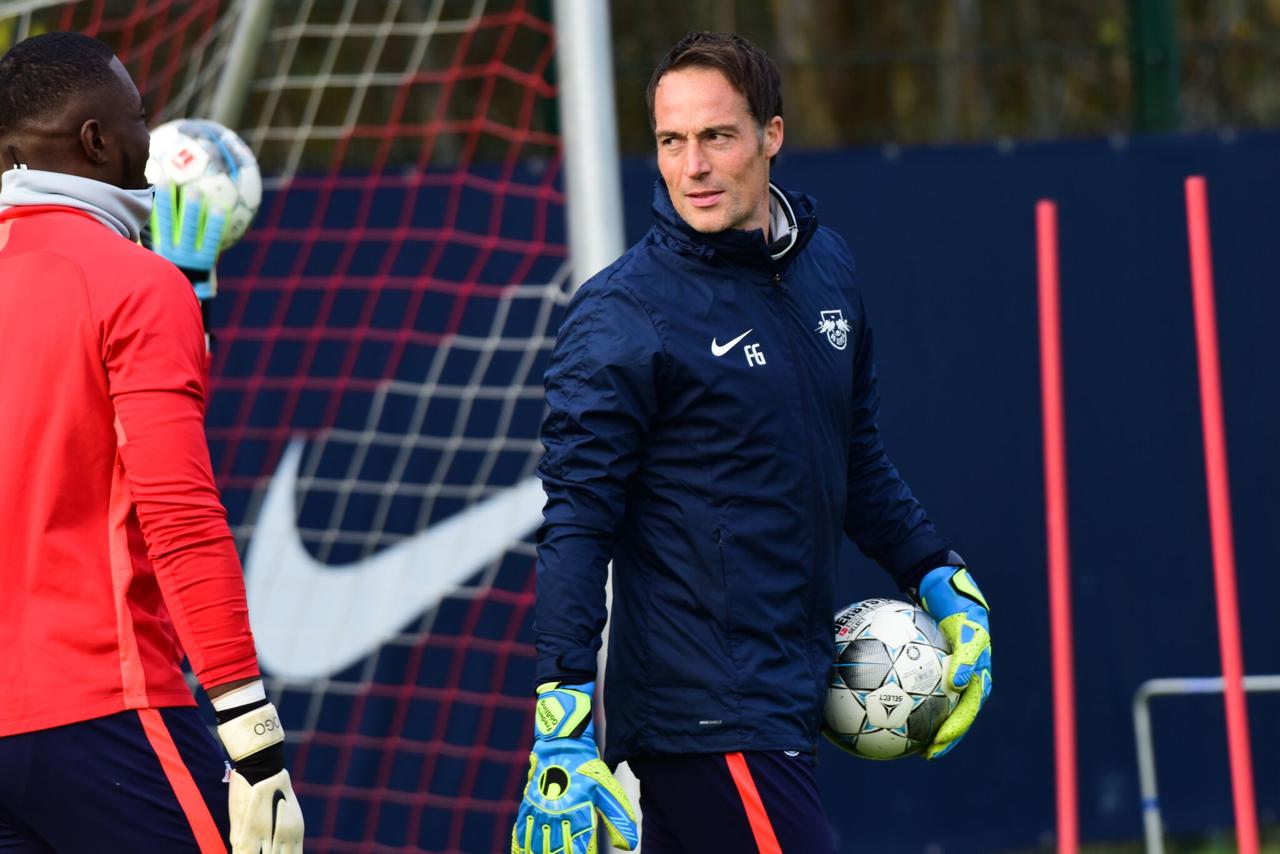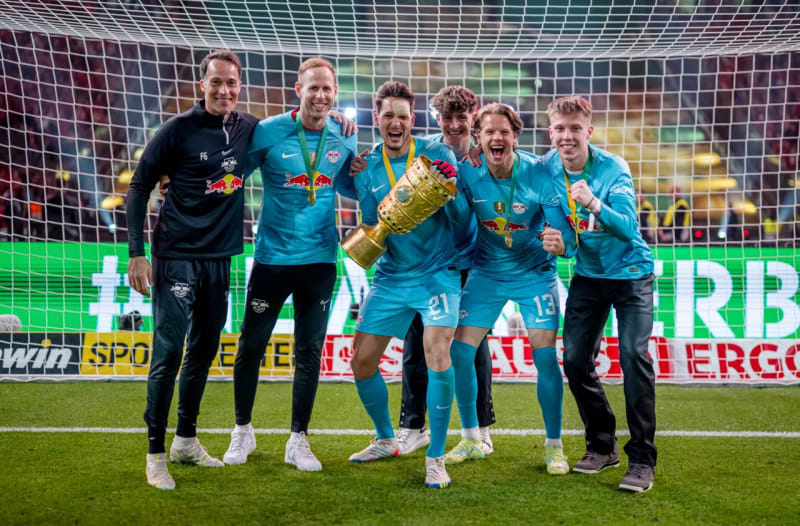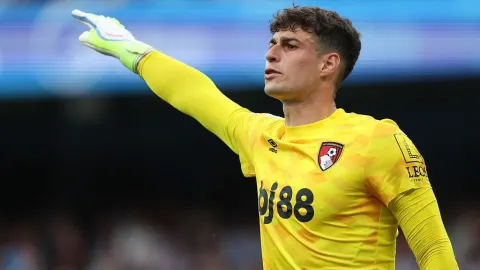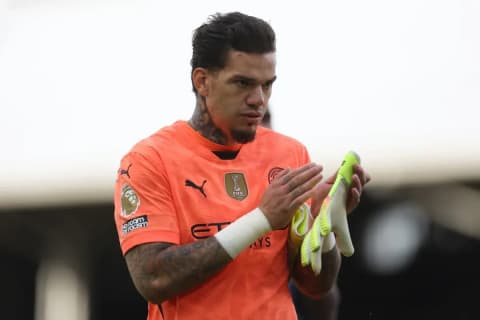Gössling has been integral to the meteoric rise of RB Leipzig and the success of the goalkeeper programme in the Red Bull group.
Hunger to succeed and the ambition to develop: these are the motives that embody Frederik Gössling’s working life and RB Leipzig’s monumental progression. Founded in 2009, Leipzig’s meteoric rise into Europe’s elite has included four promotions in seven years to reach the Bundesliga, two DFB-Pokal trophies and a Champions League semi-final. Gössling has been at the heart of this glorious journey.
Gössling has operated as the club’s goalkeeper coach for ten years. In October 2024, his contract in Saxony was extended until 2029. Rouven Schröder, Leipzig’s sporting director, described Gössling to the club’s website as “one of the best goalkeeper coaches in the world.” Schröder also labelled his work as “amazing” and how he “always searches for and finds the potential to improve.”
The majority of Gössling’s playing career was in the 2. Bundesliga and the Regionalliga. Before retirement, he studied law at the University of Münster and Anglia Ruskin University. He worked for the Professional Footballers’ Association and planned to be a sports lawyer. However, a former teammate, Roger Schmidt, approached Gössling and asked if he’d be the goalkeeper coach at SC Paderborn.
“My football heart was still beating,” Gössling touchingly reflected, speaking exclusively to Goalkeeper.com. “I had no licence or idea how coaching worked. Paderborn was a familiar club with not too much pressure and I was the only goalkeeper coach at the time. I organised the first team and academy training. I could check things out and find my way. I spent two years at Paderborn, another two years at Greuther Furth, and then moved to Leipzig. Everyday I spent as a coach brought me further away from law.”
Gössling started his journey with Leipzig in 2015, when the club was just six years old and featured in the 2. Bundesliga. “Personally, it was a step forward in terms of a bigger club, better team, higher ambitions and more pressure, “ he said. “When I arrived, the coaching staff were working in containers. Everything was very close together and the academy was just built. You could feel in all departments that everyone was working on a new project and how big it could become on day one. Everything went really quickly.”

In Gössling’s first season, Leipzig were promoted, and in the club’s first Bundesliga season, they finished second, securing Champions League football. He attributed his long stay and the club’s achievements to the vibrancy and the aspirations of the Red Bull project, citing youth, communication and shared understanding as the foundations for success.
“I wanted to work with those who were also dynamic, straightforward and ambitious. We didn’t look to recruit people who had won the Champions League. Instead, we targeted those who were ready and willing to develop. I learnt from many departments, including the athletics teams, assistant coaches, psychologists and data analysts. I spread my wings in different areas to improve communication and learn.
“I looked for a connection with the coaching staff and a support structure. It’s about being proactive. What do they need from a keeper? How can we work together? How can we organise set pieces? How should the defenders and goalkeepers communicate? How can defenders help the keepers to block shots or lead attackers to certain spaces that are less dangerous? Goalkeepers shouldn’t be on an island because it's a special position. They should be proactively integrated with the team.”
Gössling’s forensic mindset had the core belief of creating a constantly evolving goalkeeper department. He said: “I also wanted to bring stability to the performances of my goalkeepers. So even with managerial changes, I could establish and develop my department.”
Within the Red Bull multi-club ownership structure, there is a constant emphasis upon the ‘project’ ideal. Thomas Schlieck works as the Head of Global Goalkeeping at Red Bull Soccer, facilitating the player evolution pathway between clubs, providing oversight, identifying talent and suggesting beneficial club transfers, while maintaining respect for each team’s standing.
When asked about how this ownership group balances local and central control, Gössling replied: “Our daily focus is on developing our players and how we win the next match. This is true of all Red Bull teams. Every club has its individuality. Thomas oversees the big picture. We interact in global meetings.”
Prioritisation of youth has also been a non-negotiable of the club’s ideology. “Sometimes, we have a very young group,” Gössling stated. “I had a 14-year-old train with the group recently. This is the Red Bull Style. Everyone cares about the academy and helps its development. The club follows the same strategy and principles at all levels.”
Regarding the training session structure, Gössling favours a backward-planning approach, assessing the team focus, and the goalkeeper's subsequent integration.

“Let’s say we train at 11:00 am, our medical meeting is at 9:00 am. All the doctors and physios go through every player who has an injury and after that, we finalise the daily plan. I will learn how team training will be set up, how the keepers will be integrated and how long I’ll have with them. Then I’ll ask what about the team training content and its focus? What awaits the keepers when they join team training? This is the starting point.
“I don’t start with the warm-ups anymore. I think backwards. What is the main part of team training? We want a cognitive approach for the keepers to make quick decisions and swiftly find solutions so they can learn.”
Gössling breaks his goalkeeper's specific time into three parts, preparing them for team training. Warm-ups and technical preparation are designed to link to “complex training,” producing a cohesive session with a theme that is linked to the team.
“If we have 45 minutes for goalkeeper training and then they go to the team, I would do a five-minute warm-up and ten minutes of technical preparation. I’d make sure everything was not too quick or intense, getting them used to the exercise. This leads to good handling with the ball and gets the keeper ready and flexible. Then it's 30 minutes of complex training, where it's much more difficult and mistakes happen. This is the basic organisation and helps every area of goalkeeping. What warm-up, technical and complex part of keeper training is nearest to the course of team training for that day? So you can have a line through the whole day.”
The concept of a youthful project is married education, with Gössling concentrating on accountability, the ability to grow from mistakes, and the knowledge of the opponent.
“We have different principles, offensive, zonal defence and goal defence: this is how we educate young goalkeepers. This is how we scout and analyse keepers. We never want a situation where we concede goals, and we can only tell our goalkeeper, well, maybe it wasn’t your day, or they were too clinical, or your teammates didn't defend.
“We don’t want any grey areas. We always give it a name, this is why we have principles. For example, the 14-year-old who trained with me can make mistakes, but if I ask what went wrong, he should give me the answer as to why and how he can improve next time.
“The final thing is to focus on the opponent. How do they normally score their goals? How do they create their biggest chances? How do they attack in the first line? Do they run through to the goalkeeper? Which areas can we find solutions in?”
Gössling’s philosophy is simple: have a clear plan with logical principles, which are the framework to improve understanding and cohesiveness.
“A good plan allows for mental strength and developing your principles that you can rely on in your daily work. It helps me overcome psychological resistance to stress. We have the principles and we discuss them on the pitch, but not for long, as I like training to stay in a flow. I don't want to interrupt a group if I need to explain something to one person. I’ll analyse it in a video. We tape every training session to get different perspectives. After training, we sit together with a laptop to discuss what’s happened, whereas outside we only have 45 minutes.”

Despite this collective group identity and togetherness, Gössling stresses the importance of the ‘individual’, saying he doesn’t want “robots who copy each other.” He added: “We want four goalkeepers who are ready to go into the team. You’re an individual. I don’t use the same template for what each goalkeeper should do in the same exercise. They're allowed to make their own decisions.”
Although Gössling has coached for nearly 20 years, he still passionately buys into the Red Bull mindset of always striving to learn. He references Julian Nagelsmann as someone who broadened his knowledge on playing out from the back.
“Julian came with a clear philosophy on the ball, including how goalkeepers find solutions to retain possession and breathe longer before the next attack,” he said. “He wanted keepers to have a pre-orientation to create different angles and be safe with both feet. Julian developed the keepers’ offensive game and needed someone whom players could trust with the ball. The keepers and I learned a lot.”
Outside of the tactical realm, Gössling also appreciated how managers motivated a group through their words. “I like learning from head coaches how they present things in front of a group,” he stated. “How they stand there and convince people that it makes sense, and their rhetorical approaches at different points to convey positive or negative experiences. How do they create team spirit? What is their body language?
Gössling’s receptive nature extends beyond managers, positing how outfield players are also a vital point of contact in his preparation.
“I like to talk with outfield players. For example, with strikers, I ask what is the most difficult keeper behaviour for you if you run in one-on-one? Strikers then ask me, is there something special about the next keeper we're playing against? I always talk with defenders on how we can defend set pieces together.”
Gössling’s glistening accolades and reputation, coupled with Leipzig’s exponential growth, have created a fruitful partnership that could yet achieve more success.








